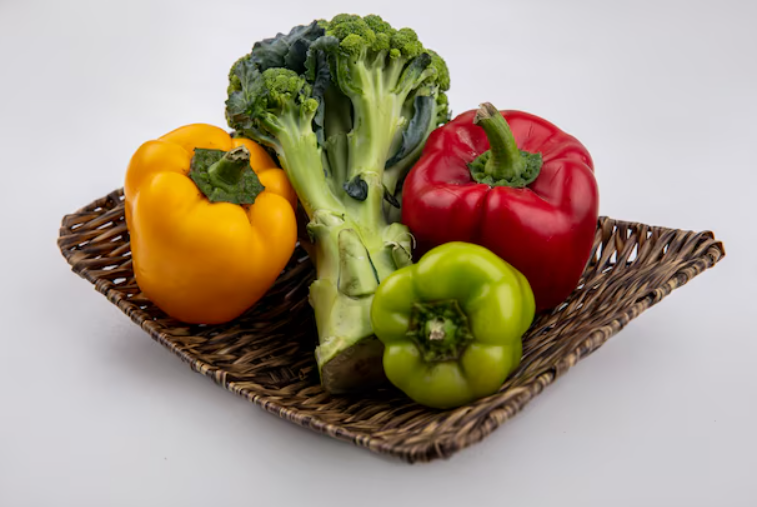Essential Vegetables for Healthy Eyesight
Keeping your eyes healthy is essential for your general health, and eating well is one of the greatest ways to maintain your eyesight. Essential vitamins, minerals, and antioxidants found in certain vegetables support eye health, ward against eye disorders, and may even enhance eyesight. The greatest veggies for your eyes will be examined in this post, along with information on their unique nutrients and how they may preserve and improve your eyesight.
Maintaining Eye Health with Vegetables
Maintaining excellent eye health requires eating a range of veggies that are high in vitamins, minerals, and antioxidants. Vitamins A, C, lutein, and zeaxanthin are among the vital elements found in vegetables like carrots, spinach, kale, and sweet potatoes. These nutrients are important for avoiding eye damage, halting age-related vision loss, and promoting general eye health. You may maintain good eye health and keen vision for many years to come by including these veggies in your regular diet. To ensure you’re receiving a broad range of nutrients that promote eye health, try to eat a colourful array of veggies for the greatest effects.
Carrots: A Well-Known Vegetable for Eye Health
The most well-known vegetable for supporting healthy eyesight is probably carrots. They contain a lot of beta-carotene, which the body uses to make vitamin A, which is essential for healthy eyes.
Health Benefits and Recipies of Carrots
- The retina, the area of the eye that is sensitive to light, depends heavily on vitamin A to be healthy. It is particularly crucial for reducing eye dryness and improving night vision. A lack of vitamin A may cause severe visual issues, including night blindness.
- Carrots also include two antioxidants, lutein and zeaxanthin, which help shield the retina from oxidative stress and block damaging blue light.
- For an additional nutritional boost, you may add carrots to soups, stews, and salads. You can also eat them raw or roasted.
Spinach: A Green Superfood for Eye Health
The antioxidants lutein and zeaxanthin, which are abundant in the retina, are among the many nutrients contained in spinach that promote eye health.
Health Benefits and Recipies of Spinach
- By blocking damaging blue light and shielding the retina from injury, lutein and zeaxanthin serve as your eyes’ natural sunblocks. Additionally, they include antioxidant qualities that lower the incidence of cataracts and age-related macular degeneration (AMD), two of the main causes of visual loss.
- Vitamin C, another strong antioxidant that helps prevent cataracts and maintains the health of the blood vessels in the eyes, is abundant in spinach.
- You may eat spinach in soups, stews, salads, smoothies, and sautéed with olive oil.
Kale: A Leafy Green Powerhouse for Eye Health
Another dark leafy green that is very beneficial to eye health is kale. It has a lot of lutein and zeaxanthin, much like spinach.
Health Benefits and Recipies of Kale
- Kale’s high lutein and zeaxanthin content lowers the incidence of cataracts and macular degeneration by shielding the eyes from oxidative stress and UV rays. Additionally, kale includes vitamin A, which is necessary to keep the retina and cornea healthy.
- Vitamin C, which is abundant in kale, boosts immunity and keeps the blood vessels in the eyes healthy.
- Kale may be sautéed as a side dish, added to smoothies, or used in salads. Another way to get crispy kale chips is to bake the leaves in a little olive oil.
Sweet Potatoes: A Beta-Carotene-Rich Vegetable
Another great source of beta-carotene, which promotes eye health, is sweet potatoes. Vitamin A, which is necessary for healthy eyesight, is derived from beta-carotene.
Health Benefits and Recipies of Sweet Potatoes
- Vitamin A, which is found in sweet potatoes, is essential for healthy corneas and clear eyesight, particularly in low light. Additionally, it promotes the retina’s general health and may lower the chance of night blindness.
- Rich in fibre and antioxidants, sweet potatoes promote overall health by lowering inflammation. Sweet potatoes may be roasted, mashed, baked, or added to soups. They are a tasty and adaptable vegetable that enriches any dish with nutrition.
Peppers: A Colorful Source of Nutrients for Eye Health
Bell peppers, especially red peppers, are rich in antioxidants and vitamin C, which are good for your eyes.
Health Benefits and Recipies of Peppers
- Vitamin C may help lower the risk of cataracts and macular degeneration and is essential for preserving the health of the blood vessels in the eyes. Beta-carotene, another substance found in bell peppers, is transformed into vitamin A to promote eye health and eyesight.
- Vitamin C and other antioxidants found in bell peppers help lower inflammation and protect the eyes from oxidative damage.
- Bell peppers may be used as a foundation for soups and sauces, added to stir fries, or eaten raw in salads. They taste well roasted or grilled as well.
Broccoli: A Nutrient-Rich Vegetable for Healthy Eyes
Broccoli offers various essential components that promote eye health in addition to being a nutrient-dense vegetable for general wellness.
Health Benefits and Recipies of Broccoli
- Vitamin C, which is abundant in broccoli, is necessary to keep the blood vessels in the eyes healthy. Additionally, it includes lutein and beta-carotene, two substances that help filter damaging blue light and shield the eyes from oxidative damage.
- Sulforaphane, an antioxidant molecule found in broccoli, may help shield the eyes from inflammation and oxidative damage.
- For an additional nutritional boost, broccoli may be grilled, steamed, or added to salads, casseroles, and soups.
Zucchini: A Versatile Vegetable for Eye Health
Because of its high concentration of antioxidants like lutein and zeaxanthin, zucchini is a nutrient-dense, adaptable vegetable that promotes eye health.

Health Benefits and Recipies of Zucchini
- The lutein and zeaxanthin found in zucchini help shield the eyes from blue light and UV rays, which over time may injure the retina. The prevention of age-related macular degeneration is another benefit of these antioxidants.
- Vitamin C, which is abundant in zucchini, supports the immune system and protects the blood vessels in the eyes.
- You can add zucchini to stir-fries, sauté it, grill it, or spiralise it to make a nutritious pasta alternative.
Tomatoes: Lycopene-Rich for Eye Protection
In addition to having a high vitamin C content, tomatoes also contain lycopene, a potent antioxidant that is good for eye health.
Health Benefits and Recipies of Tomatoes
- Research has shown that lycopene helps shield the eyes from oxidative stress, which may cause macular degeneration and cataracts. Tomatoes include vitamin C, which is also essential for collagen and healthy blood vessels in the eyes.
- Lycopene’s anti-inflammatory qualities may help shield the eyes from UV rays and lower the risk of age-related visual issues.
- Tomatoes may be used as a foundation for sauces and salsas, or they can be eaten raw in salads or added to soups and stews. Lycopene becomes more bioavailable and simpler for the body to absorb when tomatoes are roasted.
Pumpkin: A Beta-Carotene Rich Vegetable
Beta-carotene, the precursor of vitamin A, is abundant in pumpkin, another crop that promotes good eyesight.
Health Benefits and Recipies of Pumpkin
- Vitamin A is essential for preserving the cornea’s and retina’s health. Antioxidants, which are abundant in pumpkin, help shield the eyes from oxidative damage brought on by UV radiation and free radicals.
- Pumpkin is rich in fibre and vitamins that promote general health and well-being in addition to promoting eye health.
- You may use pumpkin in soups, stews, or pies, or roast it or mash it. Zinc, which is important for eye health, may also be found in pumpkin seeds.
Asparagus: A Nutrient-Packed Vegetable for Eye Health
A vegetable rich in nutrients, asparagus has a number of vitamins and minerals that are good for eye health.
Health Benefits and Recipies of Asparagus
- Vitamin E, an antioxidant that is abundant in asparagus, helps shield the eye’s cells from oxidative damage. Additionally, it includes folate, which helps maintain healthy blood vessels in the eyes and may lower the chance of cataract development.
- Asparagus also has a trace quantity of beta-carotene, which is good for your eyes.
- Asparagus may be added to salads and stir fries or eaten as a side dish after being grilled, steamed, or roasted.

